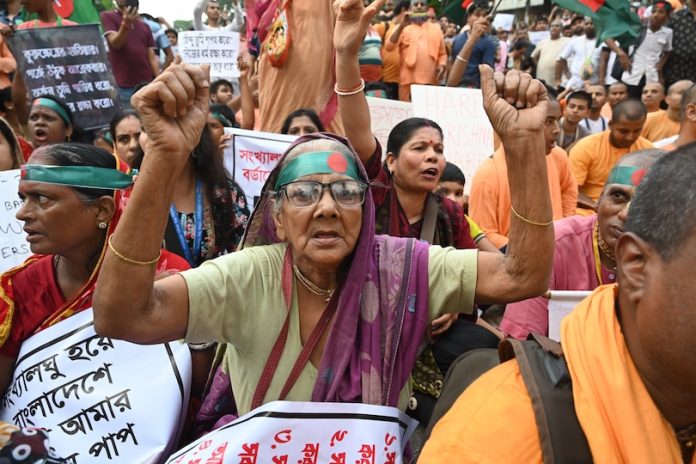The Hindu minority in Bangladesh faces a challenging socio-political environment influenced by structural violence and political dynamics. Their association with the Awami League (AL) showcases their agency and strategic decision-making, but also puts them at risk during times of political turmoil. Following the fall of Sheikh Hasina on August 5, 2024, there were attacks on 1,068 houses and businesses, mainly belonging to Hindus, until August 20, 2024. Out of these, at least 506 properties were owned by individuals linked with Awami League politics.
Robert Ted Gurr’s seminal works, “Why Men Rebel” and “Minorities at Risk,” provide insights into how systemic deprivation, perceived threats, and grievances lead marginalized communities into vulnerability cycles. However, Gurr’s framework often portrays minorities as passive victims of oppression, overlooking their agency in shaping their socio-political realities. The experiences of the Hindu minority in Bangladesh illustrate a complex narrative. Historically aligning with the AL due to its secular stance, Hindus perceive it as a safer option than Islamist ideologies. Despite feeling secure with the AL, this alignment exposes them to risks during political transitions, reflecting the complicated nature of minority politics.
Both government and non-government actors in Bangladesh use diverse approaches to address these issues, often influenced by Hindu-majority India and its relationship with Bangladesh. Recent events post the July-August upsurge, such as the murder of a lawyer in Chattogram and the arrest of ISKCON leader Chandan Kumar Dhar, have heightened tensions. India expresses concern over minority treatment in Bangladesh, while Bangladesh is alarmed by its flag being burned in Kolkata during protests related to these incidents.
This complexity underscores the importance of understanding minority vulnerabilities, considering systemic factors and their role in shaping their destinies. The Hindu minority in Bangladesh faces precarious situations due to their partisan ties, with their alignment with the AL offering protection but also increasing exposure to backlash during political unrest. This phenomenon is not unique to Bangladesh, as marginalized groups globally form political affiliations for visibility and security.
Historically, the 1947 partition continues to impact the dynamics between Hindu minorities in Bangladesh and Muslims in India, leaving both vulnerable. The entrenched divisions and communal tensions persist, requiring an inclusive national identity that transcends religious binaries. Establishing a Minority Rights Commission, enhancing legal protections, and promoting interfaith dialogue are crucial steps to address minority vulnerabilities.
Collaboration between India and Bangladesh on minority issues, cross-border initiatives, and efforts to combat hate speech can enhance regional stability and minority safety. Addressing these challenges demands comprehensive approaches, including legal reforms, cultural initiatives, and structural protections to foster inclusivity and resilience. It is essential for the interim government to pave the way for a future marked by dignity, security, and active citizen participation in shaping the nation’s destiny.




